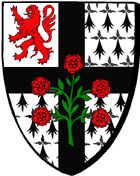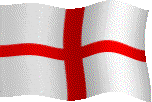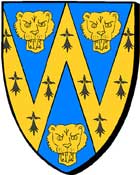
Encyclopédie Marikavel-Jean-Claude-EVEN/Encyclopaedia/Enciclopedia/Enzyklopädie/egkuklopaideia
 |
|||

England Bro Saoz |
blason en attente |

Shropshire / Salopshire ***** |
|
Wroxeter Viroconium Cornoviorum * Kêr-Wrigon |
![]()
| Pajenn bet digoret an 03.02.2006 | Page ouverte le 03.02.2006 |
|
* forum du site Marikavel : Academia Celtica |
dernière mise à jour 03/07/2025 13:48:46 |
![]()
|
Définition/
Displegadur : Ville d'Angleterre; comté de Shropshire / Salopshire,
sur le cours supérieur de la Sabrina / Sévern.
Capitale britto-romaine de la civitas des Cornovii. |
|
![]()
|
Extrait de la carte Ordnance Survey : Roman Britain. |
![]()
|
Histoire / Istor : Capitale de la cité bretonne des Cornovii, apparemment alliés des Romains lors de la conquête. Les Romains y font aboutir la première grande route diagonale sud-est / nord-ouest, venant de Douvres, et connue depuis sous le nom de Watling Street. Viroconium Cornoviorum était la quatrième plus grande ville romaine de Bretagne. Nous ne connaissons rien de particulier de cette ville durant la période britto-romaine de la Grande Bretagne. |
![]()
|
Étymologie Gerdarzh : * Eilert Ekwall : "Ouirokonion c 150 Ptol; Uri-, Viroconium 4 IA; Rochecestre DB; Wroxcestre 1155; Wroccestre c 1175 Eyton. "The Roman fort of Viriconion or Viroconion'. The etymology of the Brit name is obscure. It resembles the old name found in Archenfield". ***** * A.LF Rive & C. Smith : - Ptolemy II,3,II : Ouirokonion ( = Viroconium), a polis of the Cornovii; - AI 4696 (Iter II) : Urioconio, var. Uriocunio; - AI 48210 (Iter XII) : Viroconiorum; - AI 4849 (Iter XII) : Viriconio; variantes Uiroconio, Uiriconio - Ravenna 10640 : Utriconion Cornoviorum. Coins : of Carausius, seven (including two found at Wroxeter) have the mintmark BRI, possibly for Briconium, but see N. Shiel, The episode of Carausius and Allectus (BAR 40, Oxford, 1977), 177-180, dismissing this interpretation. The form in AI 482,9-10 perhaps results from a conflation of the city-name with the tribal name, even though the latter is not present in the other itinera. Ravenna's entry Utri- could be a miscopying of Viri-, but could also result from a scribal assimilation to Latin utri-. DERIVATION. In its strict form the name probably had Viro-, but Viri- could be a spoken form, by assimilation. The etymology has been much debated and remains unsure. If we divide the name Viroconium, the second element is as in British Ariconium, and is unknown. The first element however then has numerous Continental analogues, in addition to British Virosidum : Virodunum > Verdun (Meuse, France), Verduno (Piedmont, Italy), Verdu and Berdun (Spain), Wirten (Germany), etc.; Virovesca > Briviesca (Burgos, Spain) ; Viromagus = Oron or Promasens (Switzerland); Viroviacum > Werwick, Vervicq (Belgium); and the Viromandui people of Gaul ( > Vermandois; Augusta Viromanduorum = St Quentin). In listing these and other names in GPN 286-88, Ellis Evans allows that they may contain either Celtic *uiro- 'man' (Latin vir, Welsh gwr, Irish fear) or *uiro- ' true ' (Latin verus, Welsh gwîr, Old Irish fir). It is certainly possible to interpret Virodunum, as French scholars naturally do, 'vraie forteresse', but in other names it is hard to see that either meaning, 'man' or 'true', makes much sense or gives a natural compound, and it is likely that a third, unknown *uiro- element is involved in them, possibly in the present name also. It could be, however, that despite the attractive analogues above, we have in Viroconium a personal name plus suffix. Names such as Viriatus, Virius, Virinius are frequent in Spain (ELH I. 367), and Viricius, Vendus are widely recorded (Holder III. 379). In Britain Verica, ruler of the Atrebates, is named on coins as Verica and Ver but also as Vir, Viri (Mack Nos. 109-1316). In CIL v. 4594 (Brescia, Italy) there appears Virico. It is easy to analyse these names as Viric- (of unknown meaning; hardly *uiro- 'man') with various suffixes. The place-name Viroconium might therefore more properly be Viriconium, to be analysed in British terms as *Uirico- with suffixes *-on-io- as in CANONIUM, etc. ; a meaning ' town of *Uirico-' is likely, and is one of the possibilities admitted by Jackson in his study of the name in Britannia, I (1970), 81. The name preumably applied originally to the hill-fort on the Wrekin, and was transferred to the Roman fortress and the town which grew from it. Jackson in LHEB 601-602 and again in Britannia draws attention to other problems. The Anglo-Saxon derivative Wreocen, Wrocen, and Old Welsh Guricon, (G)ureconn (Middle Welsh Gwrygon) demand an initial *Uric- and a final *-on in the Romano-British name; but these are not found in the ancient sources. Hence Jackson supposes that there was a British by-form *Uriconon from which the Anglo-Saxon and Welsh forms were taken, and that (as Williams suggested) Romano-British Viroconium was no more than an official Latin version, lacking spoken currency in British, the Viro- Viri- forms being Latin substitutes for the 'rare and peculiar' British *Uri-; although final -ium could represent a British spoken variant *-ion. If this is right, the coins with Bri- could represent a further and later attempt to render the British sound in Latin letters, though the mint-mark could also be explained in Vulgar Latin terms as showing loss of unstressed -i- (which happened especially when in association with r) and as showing b/v equivalence; cf. Virovesca > Briviesca, above; but there are strong numismatic arguments against associating the mint-mark with Wroxeter. It is however possible that both Viroconium and *Uricon(ï)on are right, perhaps at different stages. Dottin LG 358 and Tovar ELH, I. 117 (quoting Palomar Lapesa) draw attention to the tendency of initial * Uer- to reduce to * Ur- in various Celtic regions. Examples are Ueramos-Vramus, Virincis AI 349,5 = Uruncis AI 252,2, Vitricium Al 345,2 = Utricio TP, etc., and possibly Ptolemy's Ourolanion (= Urolanium, for Veru-}; in personal names, Verbigenus-Urbigenus, Virdorix-Urdorix, etc. ; sce also British Ugueste in this List, and for further discussions, EC, XIV (1974), 61. The uncertainities of this process may also explain in part the numerous Vir- Ver- spelling variations on the coins of Verica (above) and of Tasciovanus (see VERULAMIUM), British Virvedrum for *Ver-, Viromandui / Veromandui, Virovesca / Verovesca, etc. IDENTIFICATION : The Roman city at Wroxeter, Salop (Sj 5608), capital of the Cornovii and succeeding a legionary fortress on the same site; the Wrekin with its hillfort is 4 miles to the east". ***** * A.D Mills : " Ouirokonion c. 150; Rochecestre 1086 DB. Roman fort at or near Uriconio or the Wrekin. Ancient Celtic name (possibly town of Virico + OE ceaster". |
![]()
|
Formes bretonnes anciennes / Stummoù henvrezhoneg : (en préparation) * Nennius : N° 18 : Cair Guricon. |
![]()
|
Sources / Eien : * Eilert EKWALL : The Concise Oxford Dictionary of English Place-names. Clarendon Press. Oxford. 1936. Fourth edition, 1960; reprinted 1980. * William REES : An historical Atlas of Wales, from early to modern time. Faber & Faber. London. 1951 - 1972. * Geoffrey of Monmouth : The history of the kings of Britain. Traduction Lewis Thorpe. Penguin Books. 1966 - 1973. * A.L.F RIVET & C. SMITH : The Place-Names of Roman Britain. Batsford Ltd. London. 1979 - 1982. * NENNIIS : Historia Brittonum; Annales Cambriae. textes latins et traductions anglaises par John Morris. Ed. Phillimore & Co. Ltd. 1980. * A.D MILLS : Oxford Dictionary of British Place-Names. Oxford University Press. 1991 - 2003 |
![]()
|
Liens électroniques des sites Internet traitant de Wroxeter / Viroconium : * Site communal : - Wroxeter Ville romaine | Patrimoine anglais - Guide des villes et villages - Wroxeter in Shropshire - Royaume-Uni * Wikipedia français : Wroxeter — Wikipédia * Wikipedia brezhonek : https://br.wikipedia.org/wiki/Wroxeter_(Bro-Saoz) * forum du site Marikavel : Academia Celtica * Autres pages de l'encyclopédie Marikavel.org pouvant être liées à la présente : http://marikavel.org/heraldique/bretagne-familles/accueil.htm http://marikavel.org/broceliande/broceliande.htm * solidarité nationale bretonne avec le département de Loire Atlantique : Loire-Atlantique * sauf indication contraire, l'ensemble des blasons figurant sur cette page ont été dessinés par J.C Even, sur bases de GenHerald 5. * Introduction musicale de cette page : Bro Goz Ma Zadoù, hymne national breton, au lien direct : http://limaillet.free.fr/MP3s/BroGoz.mp3 hast buan, ma mignonig, karantez vras am eus evidout go fast, my little friend, I love you very much |
![]()